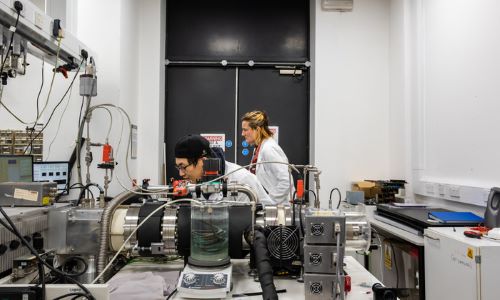Manchester researchers help secure £49.35m to boost mass spectrometry research

The bid was delivered by a coordination team, which includes Professor Perdita Barran and Dr Rosalind Le Feuvre from the University and has secured £49.35m from the UKRI Infrastructure Fund to establish C-MASS - a national hub-and-spoke infrastructure designed to integrate and advance the country’s capability in mass spectrometry.
Mass spectrometry is a central analytical technique that quantifies and identifies molecules by measuring their mass and charge. It is used across science and medicine, for drug discovery, to screen all newborn babies for the presence of metabolic disorders, to monitor pollution and to tell us what compounds are in the tails of comets.
Researchers at The University of Manchester develop and apply mass spectrometry in many of its research centres and institutes, including the Manchester Institute of Biotechnology, the Photon Science Institute, Manchester Environmental Research Institute, Wellcome Trust Centre for Cell Matrix Biology, the Biological Mass Spectrometry Facility, and the Michael Barber Centre for Collaborative Mass Spectrometry.
C-MASS will enable rapid methodological advances, by developing consensus protocols to allow population level screening of health markers and accelerated data access and sharing. It will bring together cutting-edge instrumentation at a range of laboratories connected by a coordinating central hub that will manage a central metadata catalogue. Together, this will provide unparalleled signposting of data and will be a critical measurement science resource for the UK
The bid for the funding has been developed over the last 10 years and has included input and support from more than 40 higher education institutes, 35 industrial partners and numerous research institutes.
“As part of the coordination team for this bid, I am absolutely delighted. C-Mass will be a distributed infrastructure to enhance the capabilities of mass spectrometry across the UK and grant us unprecedented insights to the molecules that make up our world.”
Professor Perdita Barran, Director of the Michael Barber Centre for Collaborative Mass Spectrometry at The University of Manchester
Now, many decades later, the University receives more funding in mass spectrometry than any other higher education institution in the UK and more mass spectrometers are made in the Manchester region than any other in Europe.
At the University, researchers across a range of disciplines including biotechnology, chemistry, biology and health use mass spectrometry for wide range of world-leading research. Just some of those projects include: imaging atoms, molecules and tissues, improving the testing and diagnosis of womb cancer, improving our understanding of Huntington’s disease and rheumatic heart disease, diagnosing Parkinson’s disease and finding treatments for blindness.
The mass spectrometry laboratories at the University boast a range of industry-leading instrumentations, not just for staff and students, but also collaborating with many external companies.





















